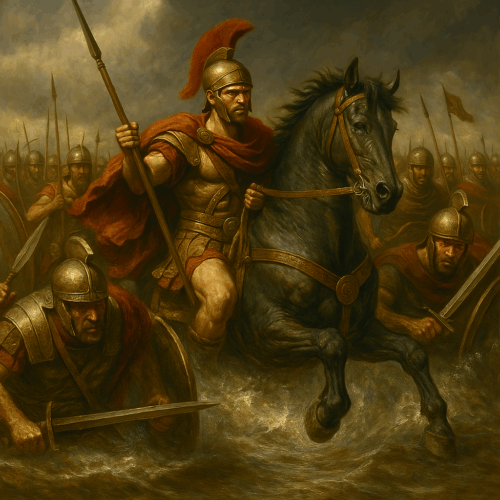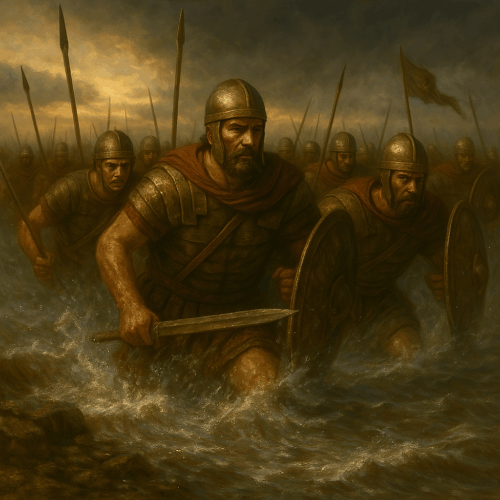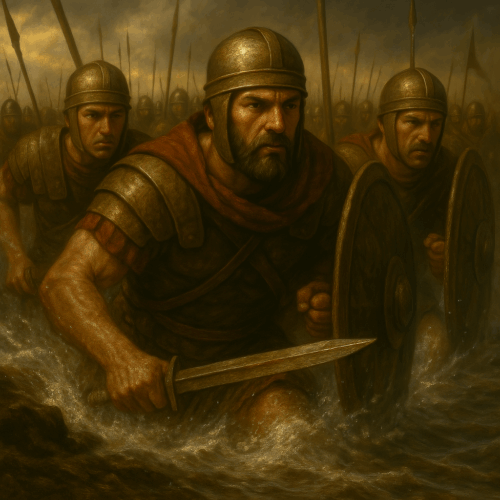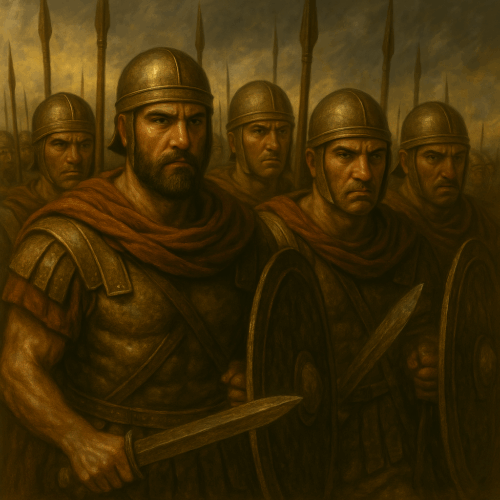On May 22, 334 BC, a momentous battle unfolded along the banks of the Granicus River. It was a day when a young commander by the name of Alexander—later known as Alexander the Great—demonstrated boldness, ingenuity, and relentless leadership. His victory against a numerically superior Persian force did more than reshape the geopolitical map of his time; it offered timeless lessons in courage, strategic planning, and visionary leadership. As we reflect on this ancient event, we will discover how these qualities can be applied today to empower individuals in their personal and professional lives.
—
## I. The Historical Canvas: The Battle of the Granicus
Before delving into the modern-day implications, let’s set the stage with the historical context. In 334 BC, Alexander, then a rising commander of the Macedonian army, found himself facing the vast and well-established forces of the Persian Empire. The battle began along the Granicus River—a natural barrier that separated Alexander’s forces from the heartland of Asia Minor. Courageously, his army crossed the unpredictable water under heavy opposition. Despite the overwhelming odds, strategic brilliance coupled with a clear vision enabled him to secure a remarkable victory.
This battle marked the opening salvo in Alexander’s long campaign of conquests, paving the way for his legendary journey across the ancient world. It was a moment when decisive action meant not just a military victory but the birth of one of history’s most extraordinary empires. The spirit embodied by Alexander that day is a beacon for anyone facing monumental challenges in life.
—
## II. The Crucial Moments on the Banks of the Granicus
Imagine the uncertainty of standing before a mighty river, the current swirling and the enemy arrayed on the opposite bank. The soldiers on either side trembled at the scale of the task. Yet, Alexander chose this moment to act decisively. He demonstrated that instinct and intelligence, when combined, could overcome even the most daunting obstacles.
The battle was not merely a clash of arms—it was an intricate dance of strategy, timing, and audacity. Alexander’s forces executed rapid maneuvers; they exploited weak points in the enemy lines and coordinated their attacks with unprecedented precision for that era. Every soldier’s role was essential, and the battle’s success lay in an unwavering collective faith in a shared vision. This historic moment reminds us that apparent chaos can yield to order through clear strategy and cohesive teamwork.
—
## III. Leadership Embodied: Traits of Alexander the Great
Alexander’s leadership on May 22 did not come by chance. His success rested on a blend of natural talent, rigorous training, and the unyielding belief in his own vision. Below are several key leadership qualities that he embodied:
- **Visionary Determination:**
Alexander was not content with merely winning battles; he aimed to change the world. His vision was expansive and compelling, driving him to pursue victories that would alter the course of history. For anyone today, having a clear, long-term vision can provide direction during uncertain times.
- **Calculated Risk-Taking:**
Confronting the unknown required valor. Alexander did not shy away from risk; he embraced it as the path to breakthrough. Whether it was venturing into hostile territory or utilizing unconventional tactics, his willingness to take calculated risks enabled him to outmaneuver stronger adversaries.
- **Adaptability and Innovation:**
At the Granicus, the formation and tactics had to be flexible. Alexander adapted on the fly, reshaping his strategy as the situation fluctuated. Instead of rigidly following outdated rules, he improvised and innovated—a quality crucial in today’s rapidly changing world.
- **Inspiring Unity through Shared Purpose:**
By clearly communicating his vision and rallying his troops, Alexander transformed individual bravery into collective strength. His ability to instill confidence and unity among his soldiers helped forge one of the greatest military forces of the ancient world.
These leadership traits are as relevant today as they were centuries ago. They offer a blueprint for how individuals can lead not only themselves but also inspire others in their communities and workplaces.
—
## IV. Embracing Risk: The Catalyst for Change
Standing at the brink of a decisive moment often requires stepping into the unknown. Alexander’s decision to cross the Granicus River was not without peril. His choice serves as a powerful reminder that progress often demands embracing uncertainty and taking bold, sometimes unconventional, risks.
In our everyday lives, risk can appear as a sudden job change, starting a new business, or even stepping out to pursue an unexplored passion. The lesson here is clear: calculated risk-taking—grounded in preparation and self-belief—can open new avenues for growth. Just as Alexander’s gamble yielded a breakthrough, so too can the courage to step out of one’s comfort zone fuel meaningful personal and professional transformations.
Consider this: every transformative moment in history began with someone facing a choice to remain in safety or venture into the unknown. Embracing risk can lead to innovation, self-discovery, and ultimately, success.
—
## V. Translating Ancient Tactics into Modern Strategy
How do you bring the valor of an ancient battlefield into your modern-day decisions? The answer lies in the art of strategy and improvisation. Alexander’s approach blended rigorous planning with the flexibility to adapt, a duality that remains essential in today’s dynamic environment.
### Strategic Planning and Flexibility
– **Set a Clear Vision:**
Just as Alexander had a vivid mental picture of a world transformed by his conquests, you too can benefit from defining what success looks like in your career or personal projects. Clarify your objectives, outline your steps, and firmly commit to your long-term vision.
– **Prepare Thoroughly but Stay Fluid:**
While planning is critical, the ability to pivot when circumstances demand change is equally important. Life—like battle—is rarely predictable. Building contingency plans and remaining open to new approaches can help you navigate unforeseen challenges without losing sight of your goal.
– **Innovate Boldly:**
Innovation often emerges from a willingness to do what hasn’t been done before. In your projects or business initiatives, don’t be afraid to experiment. Learn from each setback and adapt your tactics, just as Alexander did when facing adversity on the battlefield.
By interweaving strategic planning with flexibility, you can transform challenges into opportunities—a philosophy that was instrumental to the success of the Macedonian breakthrough at Granicus and can be equally transformative in your life.
—
## VI. Unity of Purpose: The Power of Collective Vision
One cannot talk about the Battle of the Granicus without highlighting the power of collective effort. The Macedonian soldiers were not just following orders—they were united by a shared belief in their leader’s vision. The strength and unity they displayed is an enduring lesson.
### Fostering a Collaborative Mindset
– **Build Trust in Your Team:**
Whether you’re part of a corporate team, a community group, or even a family, trust is the bedrock of collaboration. Encourage open communication, value each member’s unique contributions, and create an atmosphere where everyone feels invested in the shared outcome.
– **Cultivate a Culture of Shared Purpose:**
Align your team around common goals. When each individual understands how their role contributes to a larger vision, they are more likely to take initiative and persevere through challenges. The sense of shared purpose strengthens bonds and drives collective progress.
– **Lead by Example:**
As a leader, embody the qualities you wish to see. When your team witnesses your dedication, resilience, and innovative spirit, they’re inspired to mirror those values. Alexander’s ability to lead from the front was a key reason behind his army’s unwavering commitment, a principle that holds true in any leadership role today.
In our modern context, building unity within groups—be it in the workplace or in community organizations—can lead to exponential improvements in performance and morale. The spirit of collective action is just as essential now as it was on the banks of the Granicus.
—
## VII. Personal Empowerment: Cultivating Alexander’s Spirit in Your Life
The legacy of the Battle of the Granicus is not confined to ancient texts; it has practical implications for your personal journey. Here are some actionable strategies inspired by Alexander’s approach that can help you unleash your inner leader:
### 1. Define Your Vision
It begins by asking, “What is the legacy I want to create?” Like Alexander, having a compelling vision is crucial. Take time to reflect on your passions, your goals, and where you see yourself in five, ten, or even twenty years. Write down your aspirations and re-read them whenever you’re in doubt. This clarity of purpose serves as the compass guiding every decision you make.
### 2. Embrace Calculated Risk
Every great accomplishment demands risk. Evaluate the potential benefits and drawbacks of your next big decision, then give yourself permission to step into the unknown. Whether it’s a career shift, a creative endeavor, or a meaningful relationship, consider that risk can be the spark that ignites transformation. Remember, Alexander’s leap on the Granicus wasn’t irrational—it was a calculated risk based on thorough preparation and unshakeable resolve.
### 3. Develop a Flexible Strategy
Plan meticulously, but always leave room for spontaneity. Life’s unpredictability is not a sign of weakness but an invitation to learn, adapt, and evolve. In your endeavors, set measurable goals and deadlines, yet be open to readjusting them as new opportunities arise. This blend of structure and flexibility mirrors the exact balance that allowed Alexander’s forces to respond dynamically to the unfolding chaos of battle.
### 4. Build a Support Network
No bold leader is an island. Surround yourself with mentors, peers, and friends who challenge and support you. Cultivate relationships where open communication and mutual trust are paramount. Just as Alexander’s warriors fought with a sense of unity and shared purpose, your support network can provide the strength you need during trying times.
### 5. Reflect and Adapt
Finally, allow yourself the space for introspection. After any challenge or milestone, take time to assess what worked and what didn’t. Keeping a reflective journal can be incredibly powerful. Over time, these reflections become a reservoir of wisdom that informs your future decisions. Like the evolving strategies of ancient battles, your personal growth is a continuous process of learning and adaptation.
By internalizing these principles, you not only pay homage to a historical titan but also set yourself on a path of relentless personal and professional growth.
—
## VIII. Overcoming Adversity Through Resilience
A defining moment for any individual is how they respond to adversity. The Battle of the Granicus teaches us that resilience—coupled with innovative thinking—can turn potential defeat into a resounding triumph. Alexander’s forces, though outnumbered and facing a challenging terrain, did not surrender to panic. Instead, they adapted, fought hard, and leveraged every advantage available to them.
### Strategies to Foster Resilience:
– **Reframe Challenges:**
Instead of viewing obstacles as setbacks, see them as opportunities to grow. Every hardship carries within it a seed of progress. When faced with a difficult situation, ask yourself what lesson it holds and how it can propel you forward.
– **Develop a Problem-Solving Mindset:**
Embrace challenges as puzzles waiting to be solved. Break them down into smaller, manageable parts, and tackle them with curiosity and determination. This methodical approach, similar to how ancient generals planned their maneuvers, can simplify even the most daunting tasks.
– **Celebrate Small Victories:**
Each successful action, no matter how minor, builds momentum. Acknowledge your progress and let these achievements fuel your confidence. The journey of a thousand miles, after all, begins with a single courageous step—just as Alexander’s small steps at the Granicus led to a sweeping victory.
When you sharpen your resilience, you build an inner fortitude that makes you capable of facing life’s turbulent moments with grace and determination. This fortitude is not only empowering—it transforms challenges into a springboard for innovation and personal evolution.
—
## IX. From Battlefield to Boardroom: Leadership Lessons for the Modern Entrepreneur
The strategic elements of the Battle of the Granicus extend beyond military conquests; they offer a roadmap for anyone stepping into a leadership role today. In the fast-paced world of business and entrepreneurship, the ability to lead with vision, manage risks, and pivot in response to ever-changing circumstances is invaluable.
### Key Lessons for Today’s Leaders:
– **Initiative and Decisiveness:**
Modern entrepreneurs face markets that shift in the blink of an eye. Emulating Alexander’s decisiveness—making informed decisions rapidly and confidently—can provide a competitive edge that propels your venture forward.
– **Innovative Thinking:**
Innovation is the cornerstone of success in today’s economy. Just as Alexander found new ways to challenge and overcome his adversaries, you too can harness creativity and resourcefulness to disrupt conventional practices and pioneer novel solutions in your industry.
– **Building a Cohesive Team:**
No leader achieves greatness in isolation. The strength of your enterprise lies in the collective capabilities of your team. Invest in building relationships, harness diverse talents, and nurture a culture where every member feels integral to the shared mission. The unity displayed by Macedonian soldiers under Alexander’s command remains an enduring template for team cohesion and success.
By drawing parallels between ancient military strategy and modern business tactics, you can develop leadership qualities that transcend time. The boldness displayed on the banks of the Granicus is as applicable in the boardroom as it was on the battlefield.
—
## X. Crafting Your Personal Narrative of Triumph
Personal development is, at its core, a journey of transformation—a journey where you script your own epic narrative. Consider your daily challenges as battles waiting to be won. When you dare to envision a grander future and work relentlessly to bring that vision to life, you embody the spirit of Alexander the Great.
Here are some reflective questions to help you begin crafting your personal narrative of triumph:
– **What is the vision that lights up your ambitions?**
Define what you truly want to achieve in your life, whether it’s in your career, relationships, or personal growth.
– **Where are you willing to take risks?**
Identify areas where stepping into the unknown could unlock unforeseen opportunities. Evaluate these risks with a clear mind and a courageous heart.
– **How can you build a team to support your mission?**
Think about the mentors, friends, and professional contacts who can join you in your journey. Their diverse skills and perspectives can enrich your experience as you overcome challenges together.
– **What strategies can you adopt to remain agile in the face of uncertainty?**
Consider your approaches to problem-solving and decision-making. What can you do to adapt more flexibly to change while remaining steadfast to your vision?
By answering these questions honestly, you begin to construct a roadmap for success—one that echoes the ancient wisdom found on the banks of the Granicus. In doing so, you harness the power of history to fuel your future, transforming everyday challenges into stepping stones toward your destiny.
—
## XI. Concluding Reflections: History as a Guide for Bold Living
The Battle of the Granicus is not merely an event recorded in history books—it is a metaphor for every moment in life where action is required in the face of uncertainty. Alexander’s triumph serves as a testament to what is achievable when you blend vision, risk-taking, and the commitment to lead with courage.
In today’s complex world, where challenges abound and the future often seems unpredictable, the lessons of that ancient battlefield resonate more deeply than ever. Whether you’re facing a personal crossroads, a challenging project at work, or the uncertainties of an entrepreneurial endeavor, the spirit of the Granicus can guide you. Embrace your fears, prepare rigorously, and move forward with the belief that you possess the creativity and strategic insight to overcome any obstacle.
History teaches us that every great achievement starts with a single bold move. Let Alexander’s example inspire you to seize your opportunities, rally those around you with a clear purpose, and never fear to venture into the unknown. By doing so, you will not only honor the legacy of one of history’s greatest leaders but also craft your own extraordinary story.
May this reflection on the Battle of the Granicus empower you to lead with passion, to take risks with calculated wisdom, and to build the future you envision. Every day is an opportunity to step onto a new battlefield—one within your life where courage meets strategy and vision transforms into triumph.
In our modern lives, where technology reshapes industries and the pace of change accelerates, drawing inspiration from such timeless episodes reminds us that the essence of leadership and innovation is universal. The strategies of an ancient general can translate into a roadmap for success in your career and personal endeavors if you choose to harness those ancient lessons.
So, as you move forward in your own life’s ventures, remember that your challenges are not obstacles but invitations to act boldly, to lead decisively, and to innovate fearlessly. The spirit of the Granicus resides in every daring decision you make, every risk you embrace, and every shared victory you celebrate with your team.
History isn’t just about the past—it is a living guide that can shape our future. By reflecting on the daring feats of Alexander the Great, you unlock a reservoir of strength, resilience, and inventive strategy that can drive you to achieve greatness in your own unique endeavors.
—
## XII. Beyond the Battlefield: Expanding the Legacy of Bold Leadership
If the story of the Battle of the Granicus has sparked your interest, consider looking further into how other historical events exhibit similar themes. For instance, the Renaissance was marked by a rebirth of art and science instituted by individuals who dared to rethink established norms. The early innovators of the Industrial Revolution faced tremendous challenges but revolutionized the modern world through experimentation and persistent drive. Much like Alexander’s battle, these historical moments remind us that audacity in the face of convention changes the way we see the world.
Moreover, modern leadership literature is replete with examples that echo these ancient truths. Books on transformational leadership and entrepreneurial courage often reference history as a mirror for our current struggles—a reminder that no matter how advanced our society becomes, the core challenges of leadership, resilience, and bold innovation remain the same.
As you continue to navigate your own journey, allow these connections between ancient bravery and contemporary success to inspire you. Reflect on the battles you face and remember that each one is an opportunity to forge your own legacy, just as Alexander did on the banks of the Granicus.
—
## Final Thoughts
The Battle of the Granicus, fought on May 22, stands as a testament to the power of visionary leadership and the rewards of calculated risk-taking. By studying this ancient clash, we learn that greatness is born from the willingness to step forward, to confront challenges head-on, and to unite others under a shared dream.
Let this historical event be a reminder that every significant achievement—whether on an ancient battlefield or in today’s boardroom—requires a blend of courage, strategic insight, and an unyielding vision for the future. Embrace these values, and let them be the foundation upon which you build an extraordinary life.
May the spirit of that distant day inspire you today to lead boldly, innovate relentlessly, and pursue your dreams with the same fiery determination that sparked an empire centuries ago.
—
*By connecting the ancient past with our modern lives, we uncover timeless truths that continue to shape us. The story of Alexander the Great at the Battle of the Granicus offers a powerful lesson: sometimes, the courage to take a bold step into the unknown is the very act that transforms our lives forever. So go forth—chart your course, rally your allies, and let your inner leader shine as a beacon of hope and strength in a world teeming with possibility.*

